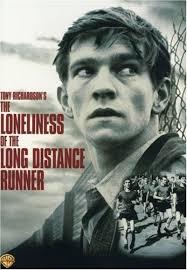 English novelist Alan Sillitoe died yesterday. He may not be a writer many are familiar with. His stories of working class life were brutal takes on everyday hard ship alleviated only by hard fought for transcendence, the likes of which -- with their rages and protests -- became increasingly rare after the end of the 1960s.
English novelist Alan Sillitoe died yesterday. He may not be a writer many are familiar with. His stories of working class life were brutal takes on everyday hard ship alleviated only by hard fought for transcendence, the likes of which -- with their rages and protests -- became increasingly rare after the end of the 1960s. His two best known works, The Loneliness of the Long Distance Runner and Saturday Night and Sunday Morning were turned into two superb films that set a benchmark in British cinema realism. In each case, due in no small measure to the 'kitchen sink ' approach of directors Tony Richardson and Karel Reisz.
Tom Courteney's performance in the lead role in Loneliness captured, for me, a true grit perspective , unmodified by easy options. For Shilitoe, struggle was relentless. It wasn't just grist for drama or excuse for a turn in the plot. Life was about surviving and fighting back, otherwise existence will grind you down.
His message essentially was that the only response was an individualized one -- making do as best you could without giving up on the core class allegiance that formatted and bore you.
There's a lot to be reminded of in Sillitoe -- that despite the glitzy remakes over the last 50 years,and all the promises we've been offered in way of a good life ahead, we are still Sillitoe heroes making do in a very different social reality to the one that we are told exists or supposedly beckons.
That we all forced to run this course alone, is our great collective tragedy.
